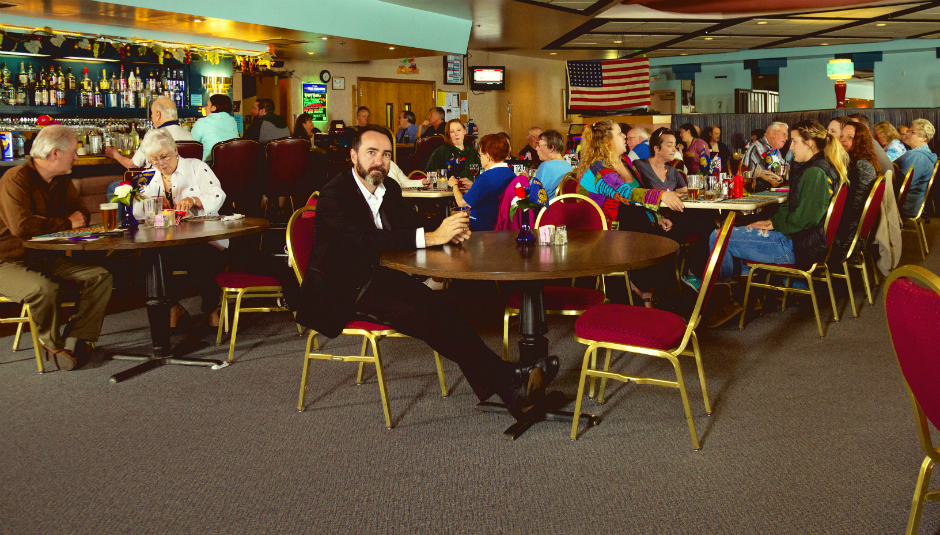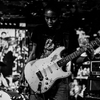Next month, The Shins will release their fifth album, Heartworms. It’s an album that ranges from eccentric pop hooks sillier than anything we’ve heard since ‘Australia’ (“Time to put ze ear-goggles on!”) to mellow troubadour whimsies, dwelling on nostalgia and anxiety. In late January, James Mercer, no longer merely the frontman or chief writer, but producer as well to boot, unveiled the album for the first time in London, before charming the audience in Q&A with Drowned in Sound’s very own Sean Adams.
A week later, once James had returned to his Portland home, via further PR stints in Australia (who would be a musician?), I had the genuine pleasure of speaking to the indie legend himself over the phone. As you will see, I found him in a candid and passionate mood…
DiS: You finished the album a number of months ago, but even though it’s the fifth album from The Shins, are there still the same nerves going into its release, or are you just able to reassure yourself with the knowledge that it’s an album you’re proud of and the reception will be what it is?
James Mercer: Well, I’m not exactly sure. It seems it’s being well received by the few people that I’ve spoken to, but of course, that’s why they’re there. I feel proud of it. I went and saw The Lemon Twigs last night, do you know this band?
I don’t, no.
They’re a very new band; one of the guys in the band is 17 and is brilliant. So it’s funny, it made me realise like how long I’ve been doing this, to think I started writing Shins songs 20 years ago, when this kid wasn’t born, and he’s up there just ripping, killing it. But I feel like I’m still here, and I’m lucky for that.
With Port of Morrow you were worried that after five years out there might not be a market for a Shins album anymore, but that album turned out well (charting at #3 in the Billboard 200), and now it still seems that the old faithfuls are going to stay loyal.
I do hope so. It looks like ticket sales for the tour that’s being booked are doing well, so yeah, there’s still a certain curiosity out there to come to see us.
You’ve said that you wanted to create something that the fans would love, but at the same time expanding your own horizons musically. Was there anything in particular you were trying to achieve with this record?
I wasn’t trying to achieve wider acclaim, I know that, because that was something I discussed with my wife when I was at the beginning stages. I think I wanted to go back and understand what it is about my songwriting that has made it successful. And I think I realised that part of that is the hours that I’ll spend in the studio, working on production things, and allowing for that space and time so that weird ideas can pop into my head, and I can have that moment to actually implement those ideas. That was sort of the reason to produce myself.
That was going to be my next question; do you feel that producing the album yourself has given you more artistic liberty?
Yeah it does, exactly, it gives you that freedom. One of the things that I’ve noticed about myself is that I will worry about other people around me and what they’re thinking a lot. I don’t want to make it sound like it’s an admirable quality; I have a problem working with people because of it sometimes. I’m just always conscious of their eye, their gaze, or whatever. And so, giving myself that time to be alone in the studio with the songs, I’ve found really important, I think I come up with interesting ideas, more interesting than I would normally.
So do you think this is the purest representation of your intention with an album that there’s been since perhaps Oh, Inverted World?
That’s a good question. It’s kind of a scary question. Just scary because when you work with other people, you don’t want to say “Oh, they were the reason that I’m unhappy with it.” It certainly isn’t that; I mean, I think that basically I have gotten myself into trouble. After Oh, Inverted World I repeatedly got myself into trouble in the studio, and then got bailed out by people who were talented (laughs). So it’s like Phil Ek and Joe Chicarelli and Greg Kurstin, kind of bailing me out of a rat’s nest that I’ve created. And this time, I think I just allotted myself the time that I knew it was going to take, to just really get into the nuts and guts of it, and figure it all out; open up the manuals and learn how to record again. And I had people around me also who helped a lot; so there’s Yuuki Matthews, who I worked very well with. I guess I’m able to ignore his concerns, sometimes.
It must take a lot of confidence not to need someone there permanently reassuring you that the work is good, or suggesting other ideas to go with; you’ve got your own stamp on it, and you’re putting it out there saying “This is what I want to do, this is what I’m proud of, take it or leave it.”
See it’s interesting, I don’t feel like I have an attitude like that; it just seems pretty natural. I mean, there were songs that I was kind of fighting for that didn’t end up on the record. But at some point I’ll recognise, I’ll kind of get a glint that there’s a lack of enthusiasm about that one particular song, and I’ll sort of address it. So I kind of read the room. And I think we’ve ended up with the best selection of songs that were available to us.
You said at the album launch that you felt the running order could almost be put on shuffle, that there wasn’t any specific framework
Gosh, I don’t remember saying that! I didn’t work so hard at the order, but Yuuki did, he was very clear about what he wanted. And I had only one little request, honestly, because ‘Dead Alive’ was upfront and I wanted to push it back, and I wanted ‘Mildenhall’ to end the first side. So it was just that one switch that mattered for me, otherwise it was Yuuki.
And to me it seems like there couldn’t be another place for ‘The Fear’ except as the closer to the album. It sounds like a good thematic bookend.
I know, right! I felt that way too. That song came together, and was pretty much done, and I had done the bulk of it alone, and then the violins were added by Mark Watrous, and the violins make the song to me. It’s hard to imagine the song without that wonderful string track.
This is the first album with a lot of the new band members. How’ve they been to work with?
Just a pleasure. That’s one of the reasons I’ve been able to do what I’ve done, because I’ve had so much help from Yuuki and Mark. And it’s been one of those great things where you work all day and then you immediately just go and hang out at a bar. I’m sad that Joe (Plummer) and Richard (Swift) can’t come and help, but these guys have brought other things. We have Jon Sortland, who I work with in Broken Bells, and he’s amazing, and a real pleasure to be around.
Songs like ‘Fantasy Island’ have so many layers going on in the background, and you were saying that songs for you start out acoustically. Who develops that sound?
A lot of Yuuki there, a lot of cool, weird synth things that he came up with. That song, when I was first recording it I thought it should be just a straight, acoustic number, very stripped down, but then it sort of kept growing, and there was a lot of additional stuff.
Thematically speaking, on Port of Morrow you were saying that love and death seemed to be the two central focuses. Are there any specific thematic focuses with Heartworms?
I guess I don’t have such a…it’s not as poignant as that. I think this record is more diverse; in a way I think it feels a little more upbeat. So I’m singing about love, and sadness, and loneliness. There’s a bit of this sort of character in Heartworms in a number of the songs, who is struggling with regret; an opportunity has passed him by, and perhaps he didn’t handle it in the way he felt like he should.
Yeah, actually the lyric from ‘So Now What’, “It’s sort of an unspoken rule that things will not turn out the way you plan”, I felt like that could almost sum up the mood of the whole album in a nostalgic way.
Right, yeah, man, very true. Life kind of happens to you and you just take it, you’ve got to ride it like you find it, like Huddie Ledbetter (aka Lead Belly) said.
See for me it was the nostalgic side of things that stood out for me, thematically, going back to your youth in the UK in ‘Mildenhall’. Perhaps you were writing about other characters in the other romantic songs, but there seems to be a kind of nice, naïve love going on; for example, in ‘Cherry Hearts’ when he’s bowled over by a kiss, it’s a nice, almost teenage way of looking at things, with that great potential that the beginning of a relationship can have. With the romantic stories, now that you’re married and you’ve got children, are you writing that from a fictional perspective, or are these real moments from your past?
I think a combination of those things. I’m thinking right now about ‘Rubber Ballz’, which is sort of a love story, a tragic love story. I knew a guy in Albuquerque, who was in love with this girl who wasn’t really good for him and she was kind of too much to handle. So I kind of exaggerated that into this character, and then somehow I set the whole thing in London in the 60s and it became kind of this very kind of British song, like Kray brothers era; something that The Smiths would sing about I guess.
In ‘Mildenhall’ you namedrop The Jesus and the Mary Chain as well
Yeah, all that happened just as I said it in that song. I think that that little hook, that simple chord progression and the way I’m strumming, I’ve been doing that, trying to write that song for like 10 years. And I think it requires total honesty, because it is my youth, it’s just this barefaced kid. I knew I had to tell a story, maybe like a Merle Haggard song would tell a story. So that was the one that I think might be interesting, especially to American kids to think of moving to Britain in the 80s and then having these experiences and kind of getting pulled out of your little shell, and being shown “Here’s hipness, here’s coolness.”
I didn’t want to bring up Garden State but the moment in the song when the girl plays you Psychocandy sort of almost seemed like Natalie Portman playing Zach Braff New Slang...
Oh my god, holy shit, you’re right, it’s totally that, dude! That’s interesting because that moment is what they’re trying to express in that movie; except that he’s older than her. But I think that most of us people who really got into music in some way and it became an important part of their lives, there’s always some moment or a person, an older brother, older sister or something, that kind of turns you on to the world of music.
And then in your case, your whole career has stemmed from that moment
Yeah, it was definitely a big moment. Not only artistically to have someone reveal something to you, it was nice to have someone look at you and go “You’re probably the other cool person,” and they entrust you with that. It’s kind of touching. I was a very shy kid, and that whole year when I first moved to England, I never hung out with anyone outside of school; back home I had my skate-buddies and stuff; then I moved and that culture didn’t really exist. To show you how shy I was, I literally never made a single proper introduction of myself to anyone for the whole fucking year. (laughs) It’s so stupid; there’s the regret. Like what the hell was that?
But then out of that you found music as solace, as a sort of harbour
Yeah of course, man, during that first year I also lucked out because I went and there was a Woolworths where they have a kiosk of records, of course they were all LPs back then. I bought The Queen is Dead and Ocean Rain in the same moment. Still two of my favourite records.
Even on Heartworms, on ‘Half a Million’ when the character is going through his panic, he reaches for the guitar. Does music always provide that outlet of anxiety for you?
I hope so. I think there’s something very therapeutic about taking things you’re thinking about and articulating them in an artistic way. You feel like you’ve wrapped that little thing up, and you can set it on the shelf now, and move on to the next thing. That’s what I was singing about there; it is this sort of solace, that’s a good word for it.
You’ve got three daughters now, and ‘Name For You’ seems to be written with them in mind. Do you feel an added responsibility when writing songs, knowing that they’re going to be listening to them?
That’s a good question, because I have thought about that before. One of the things I think about sometimes is that their friends’ parents will hear me say something in a song, and are they going to be offended if I cuss or whatever?
“My vices have voted / Her ass duly noted” stuck out as a lyric that might be a bit awkward for a girl to hear her father singing…
You’re right, totally. But there’s the other side of this, which is when I’m here in my studio, I try to shut that door and leave it behind, and I kind of rebel at certain times. I think a little bit of rebellion and almost a touch of spite is important for me, something to react to. I’ve realised recently that when I first started The Shins, the very early stuff is kind of bluesy, garage rock, psychedelia, back in ‘96. And I started to get sick of the tongue in cheek attitude around me; I just got sick of the 90s, I wanted to end the 90s, I really wanted it to fucking stop. I missed music that had passion behind it, just being comfortable in an artistic moment and not having to be so self-conscious about it the whole time. The 90s to me was very self-conscious. So that’s why I started out, because I was rebelling against the sort of responsibilities that were placed on me. In that song, at least.
On this album, you’re very honest about your own feelings, particularly with ‘The Fear’ at the end, that’s very open about your anxieties.
There is certainly a lot of real expression of my own anxieties, but that person is kind of a character in a way on this record, I think he’s kind of the same guy who is on ‘Fantasy Island’. He’s this middle-aged guy, who’s filled with regret; I have regrets, certainly, but I feel like I avoided the things that would make your life really miserable. Having my family, having the love in my life that I have … sorry, I started to choke up there. I feel very lucky, and it’s almost like there could have been this other life where I never got handed the tape, and it all could have just gone differently. I can almost smell that guy, he’s in the other room, and he would have never moved to Portland, and it would have just been a different life.
In terms of touring, you’ve got twelve dates lined up (which will be expanded), and there was an interview suggesting that the release of the album was delayed so that for festivals like Coachella you might get a good listing. Are you currently lined up for any festivals?
The promoters for Coachella put us in a festival that they’re doing, I forget what it’s called, it’s a new thing. We’re not on Coachella; I guess it seems that Coachella has changed, so that bands that are sort of at The Shins level, are playing very early in the day, and I guess it’s because it’s become so massive. I think we’re doing a bunch of festivals, but I don’t know the details off the top of my head.
You released another Broken Bells album after Port Of Morrow. Is this going to be a continuing pattern, alternating The Shins and Broken Bells?
It might, but it kind of depends on Brian (Burton), he’s been quite busy. We wrote some really strong material recently, and so I think we’ve got to make sure that that sees the light of day. But I don’t know; if you ever talk to Brian, you’ll have to ask him.
Heartworms is out on 10 March on Aural Apothecary / Columbia Records. For more information about the band, including upcoming tour dates, please visit their official website.






















